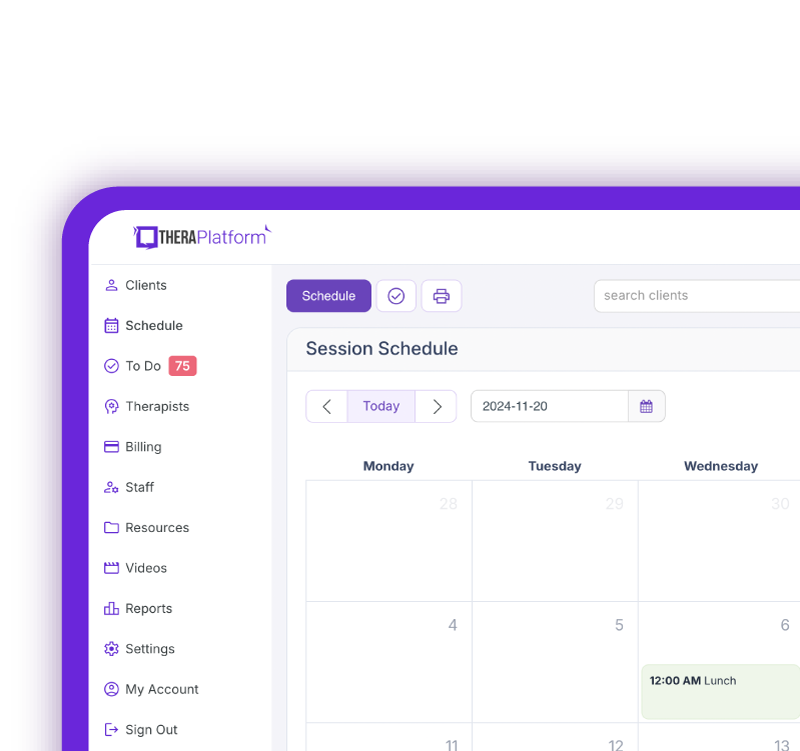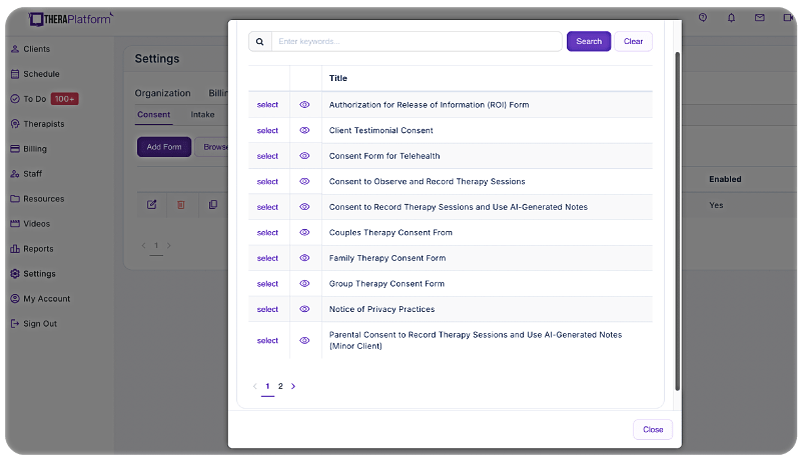Counseling informed consent forms for group therapy

Counseling informed consent forms are an important piece of the puzzle when you add group therapy as a service in your practice. In addition to providing these specialized forms to each member of the group, you will take on the additional tasks of managing this paperwork. Let's dive into some of the basics for counseling informed consent forms group therapy.
Summary
- Group therapy requires a separate informed consent form. Unlike individual therapy, group sessions introduce unique confidentiality concerns, interpersonal dynamics, and attendance policies. A tailored counseling informed consent form helps address these risks and set clear expectations for all members. Download my free consent forms.
- Consent forms should be distributed and signed before the first session. Clients must receive, review, and sign the group therapy consent form in advance—not during the first group meeting—to ensure understanding and informed participation.
- Informed consent supports ethical practice and legal protection. A signed consent form documents that clients understand their rights and responsibilities, helping protect both clients and therapists while promoting transparency.
- An EHR can simplify group therapy documentation. Platforms like TheraPlatform streamline the creation, distribution, and secure storage of group consent forms, making it easier to manage records, collect e-signatures, and reduce admin time.
Streamline your practice with One EHR
- Scheduling
- Flexible notes
- Template library
- Billing & payments
- Insurance claims
- Client portal
- Telehealth
- E-fax

What is group therapy?
Group therapy allows you to treat multiple clients in one session. A typical group will run for one to two hours and have an average of four to twelve members. Some therapists choose to have a co-leader in a group. With a co-leader, you may choose to enroll more clients into your group.
Therapists apply different types of strategies to run a group. As you establish your group, you will have some decisions to make regarding the group.
Open vs. closed groups
An open group allows group members to come into the group at any time. The group does not likely have a set amount of weeks that it will meet (e.g., 8 weeks). Most open groups will have a set topic for each week but do not necessarily have a curriculum to teach the members.
With a closed group, members can only come into the group during the first session. A closed group will meet for a set period of time (e.g: 8 weeks) and typically has more structure or curriculum to it.
Homogeneous vs. heterogeneous groups
In a homogenous group, the members have a similar diagnosis or treatment-related issue that brings them together. For example, you may choose to run a group on depression, anxiety, or trauma. A homogenous group may allow for a more intensive focus on a particular issue.
A heterogeneous group combines group members with varying degrees of differences. This format allows for the opportunity to learn from other members who have different strengths and weaknesses. A heterogeneous group might address teaching skills and interventions that can apply to various issues, populations, or diagnoses such as parenting skills, anger management, communication skills, self-esteem, or stress management.
Practice Management + EHR + Telehealth
Manage more in less time in your practice with TheraPlatform

Counseling informed consent forms
Counseling informed consent forms for group therapy should be a separate form and discussion from the standard informed consent form with your practice. Group therapy brings up additional risks for breaches of confidentiality due to the presence of additional clients in the groups as well as more activity within the office setting.
Also, group therapy brings more personalities, symptoms, and behavior into one room which deserves a focused discussion and form. As part of planning for the group, you should consider group rules, guidelines, and attendance policies. Each member must review, sign, and date the Counseling informed consent forms for group therapy as part of their record. If a client attends more than one group program with you, the client should sign separate counseling informed consent forms for each group.
At a minimum, a counseling informed consent form should include:
- Limitations and guidelines regarding confidentiality
- Purpose and description of the group
- Suggested length of the group
- Costs, copays, and any fees
- Client’s right to refuse services at any time
- The role of the therapist as the group facilitator
- The facilitator’s communication guidelines during and outside of group sessions
- Expectations of communication guidelines outside of sessions for group members
- Group rules regarding communication within a session
- Guidelines regarding attendance and late arrivals to the group sessions
- No-show/cancelation policy as it relates to group
- Rules about confidentiality upon the termination of the group or the client’s departure from the group
- Standard practice HIPAA “Notice of Privacy Practices” about access to records
As with individual sessions, the beginning of the group session should include a discussion of the information included in the counseling informed consent form for group therapy as well as an opportunity for the group members to ask any questions. This discussion should happen every time a new member joins the group. The final meeting of the group should also include a reminder of the rules regarding confidentiality upon leaving the group as outlined in the counseling informed consent form.
The importance of counseling informed consent forms
Part of the ethical guidelines when practicing therapy include communicating with your client about the rights and responsibilities of being a client in therapy as well as those of the therapist. Because group therapy brings in additional rights and responsibilities it is important and ethically responsible to present this information to each group member.
A counseling informed consent form allows the therapist to discuss with the client different aspects of treatment as it relates to group therapy. When the client signs the counseling informed consent form, it also protects the therapist and practice by demonstrating that the client has received and read the information contained in the consent.
Just as with individual therapy, the therapist should have a discussion with each member to ensure their understanding of what they signed in the counseling informed consent form. This discussion can occur individually during a therapy session or during a group session.
Free Resources for Therapists
Click below and help yourself to peer-created resources:

When should a client receive the counseling informed consent forms?
Each group member should receive the counseling informed consent form prior to attending their first group therapy session. If you treat the client as part of your practice and already have a client record, you can simply provide the client with the additional counseling informed consent forms to read, review and sign. If the client is new to you as part of the group therapy program, then the form should be part of the intake paperwork.
Most importantly, you should not hand the client a counseling informed consent form to read at the first group therapy session. You want to ensure that each group member has the opportunity to thoroughly read the counseling informed consent form and prepare or ask any questions prior to signing.
Tips on how to store group therapy documents
Between the extra forms, documentation, and preparation time, running group therapy sessions can add extra demands on a therapist’s time. An electronic health record (EHR) such as TheraPlatform can help to alleviate some of the extra stress and save you some time.
Most EHRs offer a client portal which allows for a safe and seamless way to send counseling informed consent forms to the client and obtain an electronic signature. An EHR will also provide you with a single system to safely store client information, group therapy notes, and process payments.
How an EHR can simplify intake forms for counselors

Screenshot of TheraPlatform’s intake form library
How an EHR can simplify intake forms for counselors
Through automation, TheraPlatform helps counselors easily and securely manage consent forms while saving time and maintaining compliance.
- Create and customize: Easily create consent forms tailored to your practice or use customizable templates provided by TheraPlatform. Forms include telehealth consent, treatment consent, HIPAA acknowledgments, and more.
- Send securely: Send consent forms directly to clients through our secure client portal. Clients can review and sign forms electronically from anywhere, making the process seamless and paperless.
- Track and store: Organize and securely store signed consent forms within your client’s chart for easy access and auditing, and receive notifications when forms are signed or pending.
- Compliance support: Electronic signatures and secure storage meet HIPAA and other regulatory requirements, helping you stay compliant with ease.
- Integration: Consent forms integrate with intake workflows and treatment plans, so you can automate reminders and ensure all necessary paperwork is completed before sessions.
Using practice management software with a built-in library of forms can make storing and sharing forms easy and save providers time.
Streamline your practice with One EHR
- Scheduling
- Flexible notes
- Template library
- Billing & payments
- Insurance claims
- Client portal
- Telehealth
- E-fax

Resources
Theraplatform is an all-in-one EHR, practice management and teletherapy solution with AI-powered note taking features that allows you to focus more on patient care. With a 30-day free trial, you have the opportunity to experience Theraplatform for yourself with no credit card required. Cancel anytime. They also support different industries including mental and behavioral health therapists in group practices and solo practices.
More resources
- Group therapy worksheets
- Intake form follows function
- Ultimate Teletherapy E-Book
- The Ultimate Insurance Billing Guide for Therapists
References
- American Group Psychotherapy Association. “What Is Group Psychotherapy?” Accessed January 31, 2023.
- Iyejare, O. “Heterogenous Therapy Group | Definition, Advantages, And Disadvantages.” The Self Discovery Blog, October 13, 2022. Accessed January 31, 2023.
- The Center For Ethical Practice. “Informed Consent Discussions in Group Therapy..” Accessed Jan 31, 2023.



